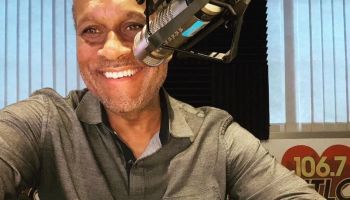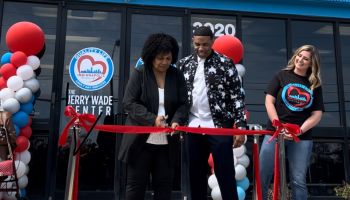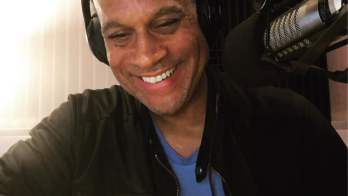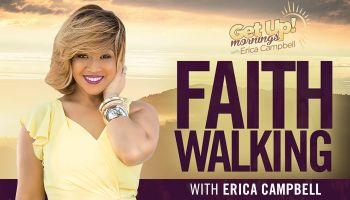For three weeks in 2002, the “DC Sniper” terrorized the Washington DC metro area with random shootings that killed 10 people and seriously injured three.
After an intense manhunt, John Allen Muhammad, 48, and a then 17-year-old Lee Boyd Malvo were arrested and later convicted of the crimes. Malvo received a life sentence. Muhammad is slated to be executed by the state of Virginia on Nov. 10, 2009.
What many do not know is that this reign of terror was allegedly a ruse by Muhammad to murder his ex-wife, Mildred Muhammad, and to get custody of his children.
In the prologue to her book, ‘Scared Silent: When The One You Love Becomes the One You Fear‘ (Atria Books, $23.00)’ Mildred writes,
“For months I had looked over my shoulder for two people: John, my ex-husband who had promised to kill me, and ‘the D.C. sniper,’ who had terrorized the Washington, D.C. metropolitan area where I lived by randomly killing people. Now I was forced to reconcile that there was only one man.”
Though she always felt threatened by John Muhammad, because she bore no physical scars, Mildred said that her pleas for help fell on deaf ears.
“I tried to get someone to listen to me that he was going to kill me,” she told Black Voices, “but because I didn’t have the physical scars to prove that I was a victim, I didn’t get the help that I felt that I needed. Eighty percent of domestic violence is not physical. So you have a lot of people walking around wounded because nobody feels their pain.”
With October being Domestic Violence Awareness month and her book being released on Oct. 13, Mildred Muhammad sat down with BV. She has a special message for the Black Voices community, which she says helped her during her time of need.
When did you know that the sniper murders were a ruse to kill you?
When the ATF showed up at my door and said they were going to name John as the sniper. [Only then] did I realize that he was shooting people around me. The gentleman Mr. LaRusso who was shot in his hand, his restaurant was right down the street where I was catching the bus to go to work. Then there was a man who was shot in the stomach at Brandywine convenience store, which was two miles away from me. Also, [John Muhammad’s] friend Robert Holmes called the area law enforcement saying that he was not sure, but they needed to look at John Allen Muhammad because his ex-wife Mildred Muhammad was in the area and he may have been trying to kill her.
Why do you think that you were spared?
I think he was caught before he got me. When I testified in Lee Malvo’s trial, his defense attorney stated that John sent Lee to my door to verify that he had the right house and when I opened the door he was supposed to shoot me in the face. Well, I opened the door, and he walked away. I don’t recall seeing him.
Do you think think you should have left John Muhammad earlier?
Only the victim knows when it’s best to leave a situation and it’s difficult to try to put everybody in the same category when it comes to that type of decision because that’s a life altering decision. And finances play a huge part in whether the victim leaves the abuser or not. I believe that I left at the time that I was supposed to. I tried to get someone to listen to me that he was going to kill me, but because I didn’t have the physical scars to prove that I was a victim, I didn’t get the help that I felt that I needed.
Why isn’t there more help for women suffering from emotional abuse?
Unfortunately you cannot arrest someone on intent and because you cannot do that, a physical assault has to take place before law enforcement will get involved.
How difficult is it to recognize emotional abuse? Can you give us three signs:
Emotional abuse for me may not be emotional abuse for you. It depends on the threshold of pain that one has for themselves…One sign is that he is telling me what I can or cannot do. “I don’t want you going to visit your family members. Why don’t you just stay home with me today?” Or, he will try to make you feel guilty for wanting to do something with your friends and family versus being home alone with him. That’s why it’s difficult for the police to step in because it’s just talking…But if you can’t talk to your partner about what’s bothering you, or you’re walking on egg shells around him or her or you’re not able to express how you feel because that person is going to blow up, or if you’re feeling trapped, those are signs. The main thing is, are you afraid of your partner?
What are three things that women in domestic violence can get do to get out.
Number one is to create a safety plan. Know what you’re going to do, how you’re going to do, when you’re going to do.
Number two. Tell only one person what you’re going to do. And make sure it’s a person you trust. Because you don’t want it to get back to the abuser. Telling more than one person [risks] your plan getting back to him.
Number three is be careful. Because [many] women who leave an abusive situation are killed. The victim knows the abuser better than anyone else.
If you see someone who’s being abused, there’s only one question you should ask – and that is: How can I help? You may be the only person that is empowering her to say what she wants versus what you think she should do. Because how many times have you heard someone say, “If I was you” or “Come and stay with me, you need to leave the situation”? So now you’ve become the abuser because you’re making me feel like I can’t talk to you because you’ve already decided what I need to do.
How are your children dealing with this?
We deal with it one day at a time. I don’t bring it up unless they want to talk about it. We see it on the news. We watch it, then let it go. I let them dictate how they want to handle it versus how I want to….Because my handling of it as an ex-wife is totally different from them handling it as their father.
Are they in contact with him?
No.
What are you doing these days?
I run After the Trauma and also I’m a national spokesperson for Domestic Violence. I’m trying to get my message out which is that you don’t have to have physical scars to be a victim or survivor of domestic violence. Eighty percent of domestic violence is not physical. So you have a lot of people walking around wounded because nobody feels their pain.
In the book, you wrote that the Black Voices community was like a refuge for you when your children were kidnapped. Can you talk about that?
If it weren’t for them, I don’t know what I would have done. After John took the children, I was trying to get help. I found that the people around me were reporting to John what was going on with me so I completely cut off all communication to the people around me and decided to go onto Black Voices to get help. And as soon as I put [my messages] up, I got social workers and attorneys telling me what to do. [The members] always asked me, because my name was RealBlackWoman, “Hey Real, did you ever find your children? What else can I do?”
When the authorities let me know I needed to fly back to Washington state to get my children, I went on Black Voices to let them know I needed some money. [The members] sent me the money to get my children and it was enough to come back. If it were not for them, I wouldn’t have been able to do it. And some of them I’m still in contact with.
Has your ex husband tried to reach out to you or your children?
I don’t know, but even if he did I have no desire to talk to him. I’ve asked [the children] if they wanted to see their dad and they said yes, so I don’t know. We’ll see how that process is. With Nov. 10 being the execution date, I don’t know how that’s going to happen in such a short period of time.
What are your thoughts on Lee Malvo? Do you see him as a victim?
I do. Because he was 15 at the time when he was with John and when he came into the picture, he was looking for a father figure. He saw John with our children and John brought him into that nucleus to be the big brother to our children. John, my son and Lee were best friends. So I was helping my children not just deal with John, but their friend as well.
Anything else?
I would like to give a special thank you to all of the members of Black Voices who were members during that time period that helped me. I wanted to send a special message to them because had it not been for them with the information and sending me the money to go get my children, then I don’t know who I would have been able to turn to. Even when I got my children back, they were the first people I went to…I went on Black Voices and said “I got my children back!” and they were praising the Lord and clapping and sending all types of emotions. The next question was: What do we have to do next? Thank you, thank you, thank you!
For more information on Mildred Muhammad or to get a Safety Plan, see
by Angela Bronner Helm















